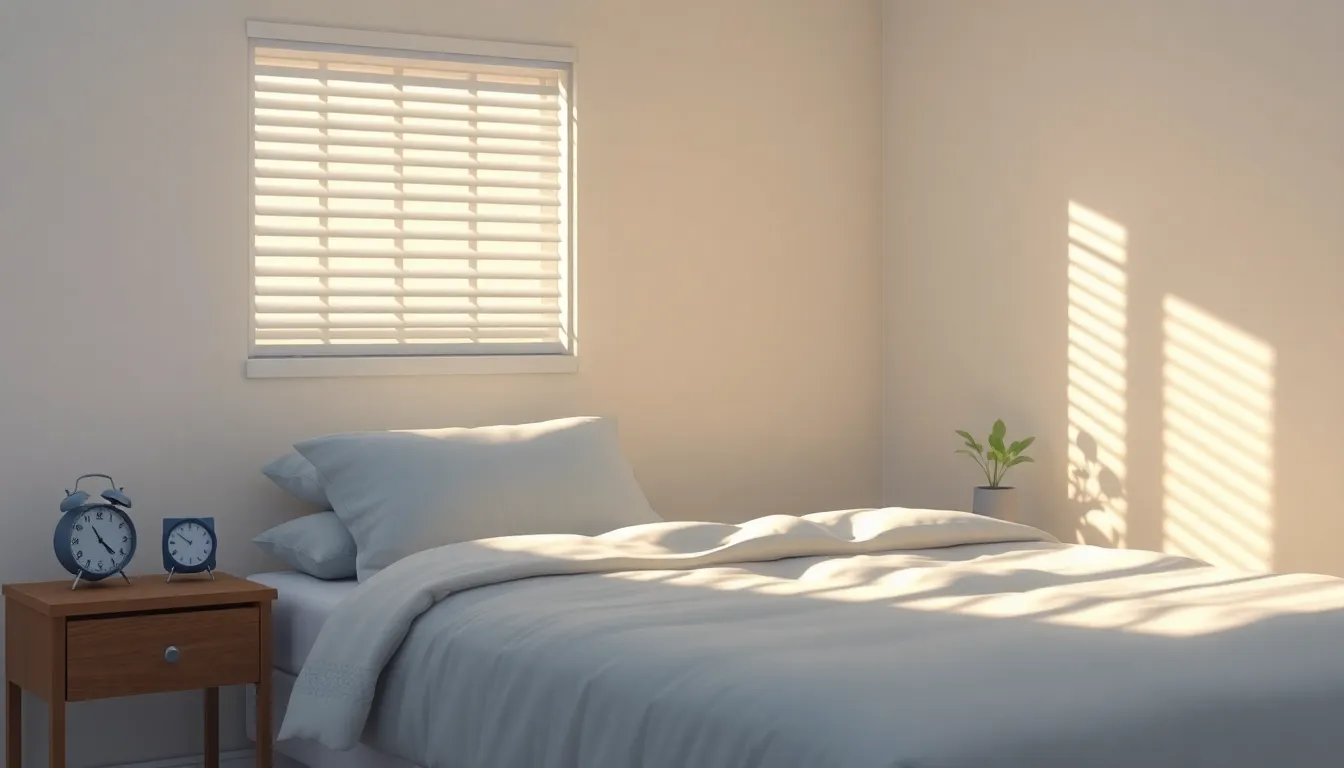In a world where binge-watching and late-night scrolling reign supreme, a good night’s sleep often feels like a mythical creature—like unicorns or that one sock that always disappears in the dryer. Yet, healthy sleep is crucial for everyone. It boosts mood, sharpens focus, and even helps maintain that elusive six-pack hidden under a layer of pizza.
Table of Contents
ToggleUnderstanding Healthy Sleep Strategies
Healthy sleep strategies play a critical role in enhancing overall well-being. Prioritizing quality sleep can significantly improve mood, cognitive function, and physical health.
The Importance of Sleep
Sleep impacts multiple aspects of health. During sleep, the body undergoes essential restorative processes. These processes include cellular repair and memory consolidation. Enhanced focus and mood directly relate to sufficient sleep duration. Adults typically require 7 to 9 hours of quality sleep per night. Lack of sleep can lead to decreased performance and chronic health issues. Incorporating regular sleep schedules and restful environments boosts sleep quality.
Common Sleep Disorders
Sleep disorders affect millions globally. Insomnia causes difficulty falling asleep or staying asleep. Sleep apnea interrupts breathing during sleep, leading to fragmented rest. Narcolepsy results in excessive daytime sleepiness and sudden sleep attacks. Restless legs syndrome causes uncomfortable sensations in the legs, disrupting sleep. Identifying and addressing these disorders is crucial for better sleep health. Treatment options range from lifestyle changes to medical interventions.
Tips for Establishing a Sleep Routine

Establishing a consistent sleep routine leads to improved sleep quality and overall health.
Creating a Sleep Schedule
Creating a sleep schedule promotes regularity. Going to bed and waking up at the same time daily helps regulate the body’s internal clock. Adults typically benefit from 7 to 9 hours of sleep each night. Setting a specific bedtime reinforces this routine. It’s crucial to stick to the schedule even on weekends to maintain consistency. Adjusting the schedule gradually allows for easier transitions to new sleep times. This practice improves both the quality and duration of sleep. Over time, a stable schedule can significantly enhance mood and cognitive function.
Managing Light Exposure
Managing light exposure plays a vital role in sleep quality. Limiting screen time before bed reduces stimulation from blue light. Directing attention to dim lighting in the evening signals the body to prepare for sleep. Morning sunlight exposure activates the body’s natural wakefulness. Utilizing blackout curtains or sleep masks blocks out unwanted light during sleep. This creates a darker environment conducive to restful sleep. Additionally, incorporating relaxation techniques before bedtime further enhances the body’s readiness for sleep. Adopting these strategies fosters better sleep hygiene and overall well-being.
Lifestyle Changes for Better Sleep
Adopting certain lifestyle changes can significantly enhance sleep quality. Focus on nutrition and physical activity, as these factors directly impact sleep patterns and overall health.
Nutrition and Sleep
Diet plays a crucial role in promoting better sleep. Consuming foods rich in magnesium, such as leafy greens, nuts, and seeds, aids relaxation. Tryptophan, found in turkey, dairy, and bananas, supports melatonin production. It’s wise to avoid heavy meals close to bedtime, as indigestion can disrupt sleep. Limiting caffeine and alcohol intake boosts sleep quality, given that these substances can lead to restlessness. Staying hydrated throughout the day ensures that dehydration doesn’t become an issue, but reducing fluid intake before bed prevents nighttime awakenings for bathroom trips.
Physical Activity and Sleep Quality
Regular physical activity significantly improves sleep quality. Engaging in aerobic exercises enhances sleep duration and deepens sleep cycles. Even moderate activities like walking or yoga can yield benefits. Timing of workouts matters; exercising too close to bedtime may lead to increased alertness, hindering the ability to fall asleep. Aim for at least 150 minutes of moderate-intensity exercise weekly to see improvements in sleep patterns. Incorporating movement into daily routines fosters a healthier lifestyle, further supporting the pursuit of restful sleep.
Relaxation Techniques for Improved Sleep
Incorporating relaxation techniques can significantly enhance sleep quality. These methods help calm the mind and prepare the body for restorative rest.
Mindfulness and Meditation
Mindfulness and meditation focus on present moments, reducing stress and anxiety. Practicing mindfulness techniques, such as guided imagery or body scanning, promotes mental clarity. Engaging in meditation for just 10 minutes daily can improve overall well-being. Research shows that individuals who meditate regularly experience enhanced sleep quality. It creates a sense of tranquility that allows for smoother transitions into sleep. Many apps offer guided sessions, helping newcomers establish their practice effectively.
Breathing Exercises
Breathing exercises serve as simple yet powerful tools for achieving relaxation. Techniques like the 4-7-8 method encourage slow, deep breaths, which calm the nervous system. With inhalation through the nose for four seconds, holding for seven, and exhaling through the mouth for eight, one can feel a noticeable difference. Incorporating these exercises into a nightly routine can promote readiness for sleep. Engaging in this practice can also lower heart rate and blood pressure, laying the groundwork for a restful night. Many find that these exercises enhance overall relaxation prior to bedtime.
The Role of Sleep Environment
Creating the right sleep environment significantly contributes to overall sleep quality. A comfortable space encourages relaxation and sets the tone for restorative rest.
Creating a Comfortable Sleeping Space
Comfortable bedding plays a crucial role in ensuring quality sleep. Choosing a mattress that supports the body’s natural alignment prevents discomfort. Pillows that suit individual sleeping positions enhance neck support, further aiding restful sleep. Room temperature should stay between 60°F and 67°F, as cooler environments promote better slumber. Additionally, using soft, breathable fabrics for sheets and pajamas can improve comfort levels. Dark curtains or blackout shades block outside light, creating a tranquil atmosphere ideal for sleep.
Reducing Noise and Distractions
Managing noise levels in the sleeping environment is essential for uninterrupted rest. Utilizing white noise machines or fans can help drown out disruptive sounds. Soundproofing the bedroom with rugs and thicker curtains minimizes external clatter, fostering a peaceful retreat. Limiting screen exposure in the evening curbs stimulation from blue light, signaling the body that it’s time to sleep. Creating a phone-free zone encourages better focus on relaxation. By reducing distractions and controlling noise, individuals can enhance their chances of falling asleep quickly and enjoying deeper rest.
Prioritizing healthy sleep is essential for overall well-being. By implementing effective strategies such as establishing a consistent sleep schedule and creating a conducive sleep environment, individuals can significantly enhance their sleep quality. Incorporating relaxation techniques and maintaining a balanced diet further supports restorative rest.
Recognizing and addressing sleep disorders is crucial for those struggling with sleep issues. With the right approach and commitment to healthy habits, anyone can improve their sleep and enjoy the numerous benefits that come with it. Investing in quality sleep is investing in a healthier and more productive life.



